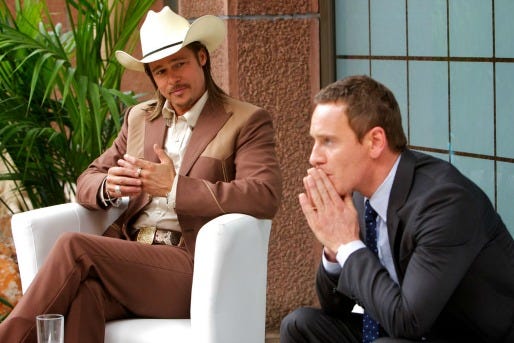The Counselor

Cormac McCarthy is a glorious novelist, and many of his books have been turned into exceptional films — such as "The Road" or "No Country for Old Men." But his first attempt, at age 80, at an original screenplay falls flat on its Gucci boot heels.
This story of drug intrigue along the U.S./Mexico border is a murky mess, all character but little plot. At one point, the movie actually loses track of its main character, an amoral (and never-named) attorney played by Michael Fassbender. In the final act, McCarthy and director Ridley Scott start introducing a bunch of new characters played by recognizable actors, who say a few lines and disappear with little consequence to their appearance.
It's almost as if there was a raffle entered by a bunch of thespians who wanted to say they were in a Cormac McCarthy film.
A strange undercurrent of sexual energy runs through the movie, with many encounters between characters having the feel of a power-trip seduction. There's very little actual sex, though, and one comes away believing these people like to talk about sex more than actually engage in it.
Penelope Cruz plays the counselor's girlfriend and soon-to-be wife, a sweet and unsullied woman who has no idea her man is in deep with the Mexican drug cartel. He provides her the high life of magnificent houses, cars and meals, and she's innocent enough to accept that he earns his pile defending low-rent criminals (like Rosie Perez, who has a strong single scene).
The counselor has an association with Reiner (Javier Bardem), a flashy club owner and drug kingpin, and decides to go in with him on a big narcotics deal. The lawyer thinks this will be a one-off, but Reiner knows better. The two men like each other's company, so going into business seems like the next step.
Hanging around the edges is Malkina, Reiner's cruel cat of a girlfriend, played by Cameron Diaz in a performance shockingly devoid of any nuance. Malkina is a predator in every way — for money, sex and attention. As if the filmmakers hadn't made this point clearly enough, they gift her with a cheetah pattern tattoo all over her body and a pair of the actual animals as pets/guardians.
My biggest problem with this movie is that all the characters speak as though their dialogue was written for them. Everything sounds very arch and constructed, as if we're supposed to revel in the resplendence of McCarthy's prose instead of believing these words would actually fall out of somebody's mouth. It's the sort of thing that works on the page but not on the screen.
Example: "Isn't that a little cold?" "The truth has no temperature."
Considering the story revolves around drug trafficking, the actual mechanics of the plot are left rather unclear. We never actually see or hear from the cartel people, though shadowy go-betweens turn up and depart without much rhyme or reason. The truck hauling the drugs — we're never even told what kind of drug it is, other than it's a lot — has all sorts of adventures on the road, changing hands several times. The counselor and Reiner get blamed for the loss, even though they were just victims, and spend the rest of the movie on the run.
Brad Pitt appears a few times as Westray, a slithery associate of the counselor who also has some skin in the game and delivers apocryphal warnings about what's to come.
This is the sort of movie in which, early on, we are told about a particularly nasty way for someone to die. And we know we're just marking time until one of the people we're watching meets that grisly fate.
This type of filmmaking is bewitching to actors because they get to speak a lot of pretty dialogue and wear cool clothes and engage in conversations where everyone's trying to pretend how smart they are. But for audiences, it's a listless wander through the desert, where the scenery is pretty but the map was lost long ago.
2 Yaps



